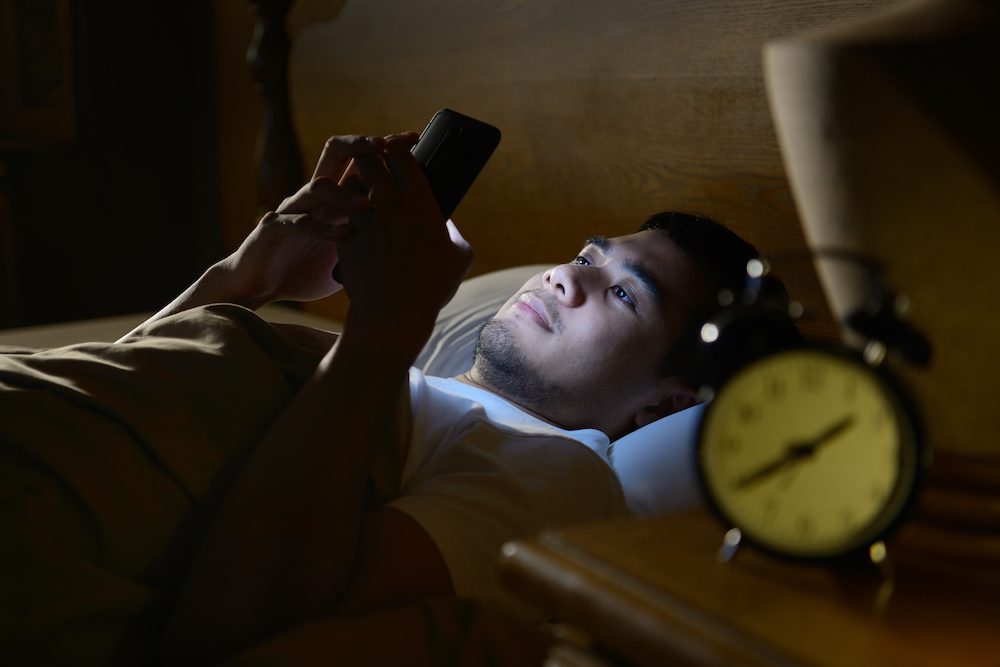Sleep hygiene is a catchall term for habits and behaviors that influence sleep. Practicing healthy sleep hygiene can help people fall asleep more quickly, remain asleep throughout the night, and feel refreshed in the morning. Likewise, poor sleep hygiene can have an adverse effect on sleep quality and duration.
The standards for sleep hygiene are constantly evolving as more research is conducted about sleep. In this guide, we’ll cover all of the current sleep hygiene recommendations and explain why good sleep hygiene is essential for your overall health and well-being.
Top 5 Sleep Tips

- 1 When you wake up, take 15 deep breaths, drink 15 ounces of water, and get 15 minutes of sunshine.
- 2 Stop drinking caffeine after 2 p.m.
- 3 Exercise daily, at least 4 hours before bed.
- 4 Avoid alcohol 3 hours before bed.
- 5 Create a sleep-wake schedule based on your chronotype.
Principles of Sleep Hygiene
Sleep hygiene guidelines fall into two categories. One category pertains to activities and habits during the day that impact sleep. These guidelines include:
- Follow a Consistent Sleep-Wake Schedule: Going to bed and waking up at the same time each day can help you establish a healthy routine and sleep better each night. There’s no one-size-fits-all sleep schedule, but understanding your chronotype can help you align a customized schedule with your natural preferences.
- Carefully Time Your Naps: Napping after 3 p.m. can be disruptive to your sleep. Furthermore, nap duration is an important consideration. Napping for more than 30 minutes can lead to deep sleep that creates feelings of confusion and grogginess after waking that may last for hours. Shorter naps, on the other hand, make you feel refreshed without the cognitive impairment.
- Exercise Daily: Physical activity during the day can help you feel more tired and ready for sleep in the evening. Exercising close to bedtime may cause arousals that make falling asleep more difficult, so morning to mid-afternoon will probably be the best time.
- Avoid Nicotine Products: Cigarettes, chewing tobacco, and other tobacco products that contain nicotine can interfere with healthy sleep. Researchers have documented sleep disturbances among active nicotine users, as well as those experiencing withdrawals from tobacco cessation.
- Spend Some Time in the Sunshine: Natural light and darkness guide the circadian rhythms that regulate your sleep cycle. Exposing yourself to sunshine during the day can help keep your circadian cycle properly aligned.
The second category belongs to sleep hygiene you practice in the hours leading up to bedtime and during the night. These guidelines include:
- Abstain From Caffeine Late in the Day: Caffeine is a stimulant that produces feelings of alertness that can last up to six hours. Consuming caffeinated foods and drinks in the morning or early afternoon may not affect your sleep, but these should be avoided in the late afternoon and evening.
- Refrain From Alcohol Before Bed: Many people believe alcohol is a sleep aid, but this is untrue. Alcoholic drinks can induce feelings of sleepiness that help you fall asleep more easily, but alcohol can also cause sleep fragmentation during the night that interferes with your sleep cycle. The effects of alcohol on sleep are largely dose-dependent – the more you drink, the greater the impact on your sleep quality.
- Avoid Heavy Meals at Night: If you feel hungry after dinner, opt for a light snack instead of a larger meal. The latter can make falling asleep difficult and disturb your sleep during the night.
- Relax in the Evening: Light stretching or yoga, reading, and listening to music are activities that promote feelings of relaxation before bedtime. Avoid vigorous exercise and other arousing activities.
- Limit Your Screen Time: Cell phones, tablets, televisions, and computers all emit blue light through their screens. This light is believed to suppress production of melatonin, a sleep-inducing hormone your body releases in the evening. Research also suggests blue light can damage photoreceptors in the eyes.
- Create a Sleep-Friendly Bedroom: The ideal bedroom for sleeping should be dark, cool, and quiet. Turn off cell phone alerts during the night. The optimal temperature for sleeping is thought to be between 66 and 70 degrees Fahrenheit, so adjust your bedroom’s thermostat accordingly.
- Get up if You Can’t Sleep: Lying in bed during the night can negatively impact your sleep. If you have been awake for more than 20 minutes, get up and engage in a relaxing activity like reading or listening to music until you feel tired again.
Start Improving Your Sleep Hygiene Today
Sleep Hygiene for Children
The sleep hygiene guidelines listed above apply to both adults and children. However, children need more sleep than adults and parents may need to take extra measures to ensure their child is sleeping enough each night. Current sleep recommendations for children based on age are as follows:
| Age Group | Recommended Amount of Sleep |
|---|---|
Infant, 4-12 months | 12-16 hours |
Toddler, 1-2 years | 11-14 hours |
Preschool, 3-5 years | 10-13 hours |
School-age, 6-12 years | 9-12 hours |
Teen, 13-18 years | 8-10 hours |
Children under the age of 5 sleep at night and nap during the day in order to get the sleep they need. Parents should help their children establish a bedtime routine as they transition toward primarily sleeping at night. This routine should integrate personal hygiene tasks, such as bathing and brushing teeth, and possibly a light snack if the child is hungry. Depending on the age of your child, you may be able to help them sleep better by encouraging healthier daytime habits along with a consistent bedtime routine.
Sleep Hygiene for Shift Workers
Shift work is defined as any job schedule that falls outside the traditional daytime working hours. In the U.S., roughly 16% of workers follow a schedule that involves night, early morning, split, or rotating shifts. These employees are susceptible to sleep problems, including the condition known as shift work sleep disorder.
If you work at night and need to sleep during the day, then your sleep hygiene needs are vastly different from people who work traditional daytime shifts. Sleep hygiene guidelines for shift workers include:
- Find a Sleep Routine That Works for You: Some shift workers time their sleep to wake up close to the beginning of their next shift. This may be more effective than going to sleep as soon as you get home. You may also find a good rhythm by dividing your sleep into two segments, one when you get home and the other that ends near the start of your next shift. Some trial and error may be needed to nail determine the best sleep schedule for you.
- Stick to Your Sleep Schedule Every Day: Sleeping at night and being awake during the day when you aren’t working can make readjusting to your work schedule more difficult. Try to follow the same sleep-wake routine even on your days off.
- Invest in Accessories That Block Light and Noise: A sleep mask or blackout curtains can prevent sunlight from interfering with your sleep during the day. If your residence or neighborhood is relatively loud, you may be able to block noise using ear plugs or white noise.
- Restrict Caffeine Consumption to the Beginning of Your Shift: Drinking coffee or other caffeinated beverages near the end of your shift can make falling asleep more difficult when you get home. Avoid caffeine within three to four hours of leaving work.
- Nap at Work if Possible: A short nap can have a refreshing effect and help you finish your shift without feeling too tired. This may also prepare you for the commute home. Shift workers are considered at high risk of being involved in a car accident due to drowsy driving.

Why Is Good Sleep Hygiene Important?
Sleep is essential to your physical and mental health. Practicing good sleep hygiene can help ensure you reap all the benefits of a good night’s rest. Those who don’t get enough sleep on a regular basis can increase their risk of certain diseases and medical conditions, including:
- High blood pressure, heart disease, and stroke
- Kidney disease
- Obesity and Type 2 diabetes
- Depression, anxiety, and other mental health disorders
Health aside, good sleep hygiene also helps you perform well the following day. People who get an adequate amount of sleep generally have sharper concentration and an easier time remembering than those who don’t. Insufficient sleep can also make you irritable and cranky, which may have social and professional repercussions.
Optimizing your sleep hygiene practices can lead to major improvements in your sleep quality. That said, people with sleep disorders such as insomnia or sleep apnea may need further intervention to get the rest they need each night. Talk to your doctor if you are concerned about your sleep or experiencing sleep problems.
References
Ask the Sleep Doctor
Have questions about sleep? Submit them here! We use your questions to help us decide topics for articles, videos, and newsletters. We try to answer as many questions as possible. You can also send us an email. Please note, we cannot provide specific medical advice, and always recommend you contact your doctor for any medical matters.



